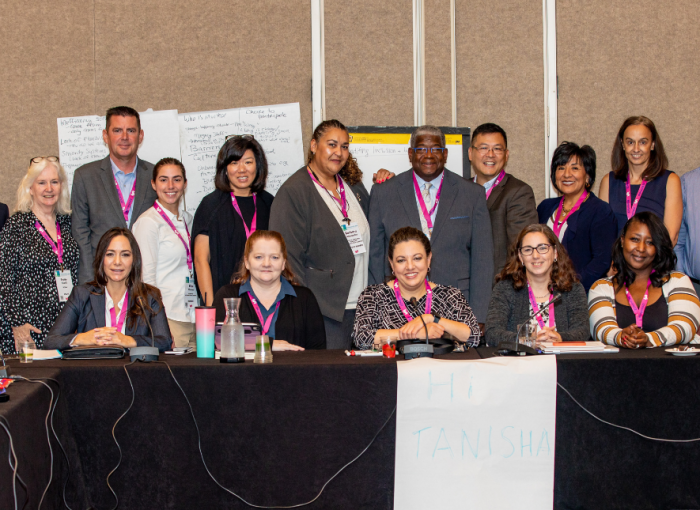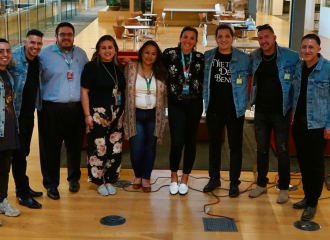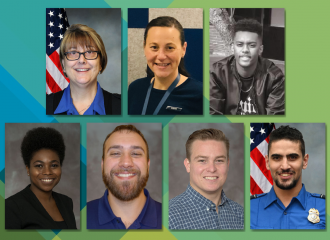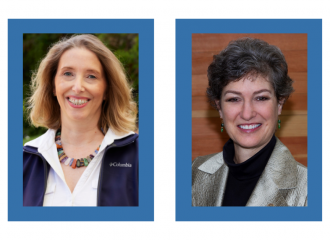Building shared prosperity for the region through travel, trade and economic development is critical to the future of the Port of Portland. We’re dedicated to using our resources, expertise and influence to reduce barriers and create opportunities for communities of color, low-income workers and people with disabilities, and we welcome the chance to extend this commitment beyond our region whenever possible.
Part of making this work fit into every aspect of our business means encouraging employees to engage in shared prosperity in ways they feel are impactful. Bringing this goal into focus is Shared Prosperity Program Specialist Barbi Alexander.
Barbi is a founding member of Airports Council International – North America’s (ACI-NA) brand-new Diversity, Equity and Inclusion Working Group. She’s also helping to establish a Pacific Northwest chapter of the Airport Minority Advisory Council (AMAC), all while representing the Port as a member of the Multnomah County Planning Commission.
We spoke with Barbi about her efforts to shape an industry that’s welcoming to both travelers and everyone who helps make an airport run.
Tell us a bit about ACI-NA and AMAC.
Airports Council International – North America (ACI-NA) is a membership-based association that does two primary things: 1) Advocates on behalf of commercial airports to all levels of government and 2) Acts as a hub for information-sharing between members about nearly every aspect of running an airport, from operations to media relations.
The Airport Minority Advisory Council (AMAC) is the only national association dedicated to advancing women and marginalized communities pursuing careers in the aviation industry. My Port colleague, Equity Contracting Manager Kimberly Sutton, is vice chair of AMAC’s Chapters Development Committee.
What are the ACI-NA’s DEI Working Group’s top priorities?
ACI-NA is seen as the quintessential authority on airports, so it makes sense that the working group is leading the effort to support airports on their diversity, equity and inclusion journey and to create structure where there might not be any.
We know many of our fellow North American airports don’t have a diversity, equity and inclusion office or director. In some airports, anything DEI-related might fall under the purview of Human Resources. At the industry level, there aren’t any airport-specific guides, tools or best practices to support airports trying to engage in DEI work.
Our goal is to spend the next two years developing a comprehensive guide to DEI in the airport industry. It might include things like terminology and resources, or guides for developing outcome-based programs. By building on existing materials and learning from what some airports are already doing, we hope to create foundational resources and a community of knowledge and support for airports that want to move their DEI work forward.
What does DEI look like for an airport?
DEI should inform internal decision-making, policies and procedures. This can include what businesses are awarded contracts, what the selection process looks like, who we hire as employees, how we build accessibility into the travel process, where we focus efforts to change policy and who we look to for input. All these aspects are intertwined and reflected in the airport business, the communities we serve and the passenger experience.
At PDX, this shows up in the artists who have installations in the terminal, the small businesses that operate concessions, the accessibility experts we consult with on new designs including the sensory room or our parking signage, and the community partners we collaborate with, including for our newest display in the south tunnel.
What types of opportunities will the Pacific Northwest AMAC chapter provide?
There’s so much possibility with this recently formed chapter! As we grow, there will be leadership development opportunities for employees as well as opportunities to support concessions and business and properties teams. AMAC is a supportive lobby for minority- and woman-owned small businesses in the U.S., and they have extensive resources for everything from advertising to bookkeeping. This will allow us to be at the table for larger discussions around economic development, how we’re interacting on a world stage when we’re talking about shared prosperity, and what we’re bringing back to the region.
How does your perspective benefit the members of these groups and how will your participation in these groups benefit the Port of Portland?
The Port is advanced in its DEI journey. I’m proud to be representing Portland International Airport and the Port, and even more honored to have an opportunity to share what I’ve learned to help others across the country.
With AMAC, many airports applied for chapters, but only eight were selected, which shows how much impact we have in this area. At the Port, we have a DEI manager, a strategic plan grounded in shared prosperity, educational programs, employee and business resource groups, and ongoing support for this work. Many airports don’t have these things in place – even if they want to, the infrastructure just isn’t there yet.
Even more exciting than sharing our learnings and adding to this pool of growing knowledge is bringing pearls of new ideas back to our teams. We benefit from discovering what works for others and what doesn’t. Every region has its own culture, and communities don’t just have diverse needs – they also have diverse ideas! For example, there was a recent conversation around developing a daycare center, given recent changes to FAA regulation.
Through the ACI-NA DEI Working Group, we get to connect with folks – not just in other departments, but in other parts of the country – and hear about what’s working for them. We also look forward to full partnership with Seattle-Tacoma International Airport in the Pacific Northwest AMAC chapter.
What are you most excited to accomplish as a member of these two organizations?
I believe that the more inclusive and welcoming an airport is, the more it is an ambassador for the region. As an international airport, PDX sees travelers from across the globe, and we should make sure that every single person who comes through our airport feels welcome. I’m really excited about this opportunity to help influence how airports across America can be more welcoming and inclusive.





